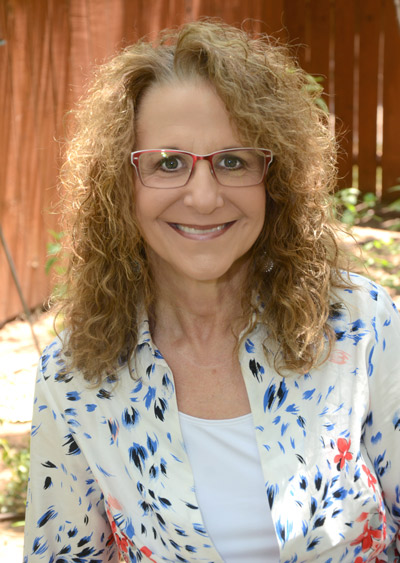Sheila Garos, Ph.D.
Email: sheila.garos@ttu.edu
Phone: (806) 834-1344
Website: https://s3xlab.wixsite.com/research
Office: 311, 311A Lab: 451B-C
Education:
Ph.D., 1998, Arizona State University
Dr. Garos will no longer be taking students for the 2024-2025 academic year in her
joint lab with Dr. Joe Currin.

Previous Positions
I have over 25 years experience in mental health, working with a variety of chronic
populations including the seriously mentally ill, substance abusers, and offenders.
As a court investigator in Arizona, I conducted evaluations to determine whether a
guardian or conservator should be appointed for incapacitated or abused adults. As
an adult probation officer, I managed a caseload of offenders and made sentencing
and probation recommendations to the court. I have also worked with federal offenders
on pre-release status as well as schizophrenic patients in community placements.
Research
Interests:- My research interests have primarily been in the area of disorders of sexual frequency and control. Thus, my past research focused on the construct of sexual addiction as a diagnostic entity, and whether sexual addiction should be considered clinically distinct from other compulsive sexual behaviors and paraphilias. Related to this interest, I developed the Garos Sexual Behavior Index which is a 70-item scale developed to assess the cognitive, affective, and behavioral dimensions of problematic sexual behavior using the following four subscales: Discordance, Permissiveness, Sexual Obsession, and Sexual Stimulation. The GSBI has been effective in discriminating between incarcerated sexual offenders and non-sexual offenders as well as self-ascribed sex-addicts from non-addicts. The GSBI is currently published by Western Psychological Services. More information about the measure is available at http://portal.wpspublish.com/portal/page?_pageid=53,235419&_dad=portal&_schema=PORTAL
- More recently, I have conducted studies to examine the effects of temptation bias on one's ability to resist engaging in tempting sexual situations. One of my lab students is investigating whether having a constructivist versus logical positivist world view affects one’s ability to accurately judge MySpace web pages. Another is examining temptation bias by using an eye-tracker and asking participants to judge how long they think they would look at certain parts of images that have embedded sexual content, and then measuring how long they actually look. Part of my research has focused on constructs of sexism. My students and I are currently investigating sexist attitudes toward men’s and women’s sexual behaviors. We have another study looking at infertility and “wishful thinking.” In addition, I conducted past research with the University Medical Center Divisions of Urology that looked at how partner adjustment affected prostate cancer patient care and recovery outcomes. I have a graduate student who is extending this research to hysterectomy patients. In the future I hope to conduct treatment outcome studies to evaluate how various treatment modalities affect sexual function, relationship satisfaction, and overall quality of life for patients with medical conditions that affect sexual function. We also continue to do validity studies with the GSBI. The most current is looking at the relationship between the GSBI and Millon Clinical Multiaxial Inventory-III.
- Garos. S. (2020, February 6). Goodbye is just the beginning. Journal of Loss and Trauma. Retrieved from https://doi.org/10.1080/15325024.2020.1721726
- Kluck, A. S., Garos, S., & Shaw, L. (2018). Sexual functioning and disordered eating: A new perspective. The Bulletin of the Menninger Clinic: A Journal for the Mental Health Professions, 82, 71-91. doi:10.1521/bumc_2017_81_10 [Impact Factor = 0.919].
- Parent, M. C., Garos, S., Branscome, E., and Piper, M. (2017). What is bad from the gander is bad from the goose: Development and validation of the women’s objectification of women scale. Assessment, February, 1-18, DOI: 10.1177/1073191117754 [Impact Factor 3.062]
- Zhang Y, Phy, J. L., Scott-Johnson, C., Garos, S. Orlando J., Prien S., & Huang J. (2017). Effects of a Delphi Consensus Acupuncture Treatment Protocol on the Levels of Stress and Vascular Tone in Women Undergoing In-Vitro Fertilization: A Randomized Clinical Trial Protocol. BMC Complementary and Alternative Medicine. 17:197, DOI: 10.1186/s12906-017-1693-4 [Impact Factor = 2.94]
- Vencill, J., Elliot, T., Garos, S. (2015). It’s not the size of the boat or the motion of the ocean: The role of self-objectification, appearance anxiety, and depression in female sexual functioning. Psychology of Women Quarterly, June.
- Beggan, J. K., Vencill, J. A., & Garos, S. (2014). Vulnerable but aloof versus naughty and nice: Contrasting the presentation of male and female nude models in Viva and Playboy. Journal of Sex Research, 51, 265-279.
- Vencill, J., Beggan, J. K., & Garos, S. (2013). The good-in-bed effect: College students’ tendency to see themselves as better than others as a sex partner. The Journal of Psychology: Interdisciplinary and Applied, 147, 415-434.
Teaching Interests and Activities
Graduate courses I teach include:
- Contemporary Professional Issues (Ethics)
- Practicum
- Psychopharmacology of Psychoactive Drugs
- Group Counseling and Psychotherapy
Undergraduate courses I teach include:
- Principles of Interviewing Techniques
- Drugs, Alcohol, and Behavior
In the future I plan to teach a graduate level Human Sexuality, Sexual Disorders, and Sex Therapy course. I would also like to develop a seminar course in Substance Abuse and Treatment of Addictive Disorders.
Applied Interests and Activities
I maintain a small private practice. In addition to general psychotherapy, my clinical specialties include substance abuse and addiction, as well as the treatment of paraphilias, sexual dysfunctions, as well as sex and marital therapy.
Psychological Sciences
-
Address
Texas Tech University, Department of Psychological Sciences, Box 42051 Lubbock, TX 79409-2051 -
Email
kay.hill@ttu.edu
